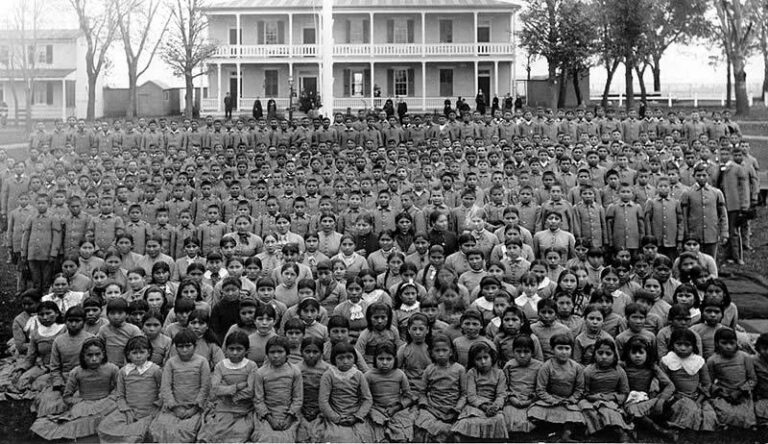President Joe Biden has issued a formal apology for the “horrific era” of Native American boarding schools in the United States, acknowledging the profound suffering inflicted on Indigenous communities through policies aimed at forced assimilation. The apology, delivered during a solemn White House ceremony, marks a significant moment in addressing a painful chapter of American history that disrupted Native families, cultures, and identities for generations. This historic gesture comes as part of ongoing efforts to recognize and reconcile the lasting impact of these institutions on Native American peoples.
Biden Acknowledges Historical Atrocities of Native American Boarding Schools
President Joe Biden publicly expressed deep remorse for the U.S. governmentŌĆÖs role in the establishment and operation of Native American boarding schools, which forcibly separated Indigenous children from their families and attempted to erase their cultures. Calling it a “horrific era,” Biden emphasized the lasting trauma inflicted on Native communities and acknowledged that these institutions were part of a broader strategy aimed at cultural assimilation. The apology comes amid ongoing efforts to uncover the full scope of the abuses endured, as well as moves toward reconciliation and restorative justice.
The administration highlighted several key points regarding the boarding schoolsŌĆÖ impact, including:
- Loss of Native languages and traditions due to forced assimilation policies
- Widespread physical and psychological abuse reported by survivors
- Generational trauma affecting families and communities to this day
| Boarding School Era | Estimated Students Affected | Key Abuses Documented |
|---|---|---|
| Late 19th to mid-20th century | Over 100,000 | Forced assimilation, cultural suppression, abuse |
| 1950s to 1970s | Thousands | Neglect, continued abuse, loss of family ties |
Impact of Boarding Schools on Indigenous Communities and Cultural Heritage
The legacy of Native American boarding schools is a deeply painful chapter in U.S. history, characterized by forced assimilation efforts that sought to erase Indigenous identities, languages, and traditions. Children were removed from their families, subjected to harsh discipline, and forbidden from practicing their cultural heritage. These schools disrupted the transmission of indigenous knowledge and customs, leaving a generational scar evident in many Native communities today. The psychological and cultural trauma is compounded by loss of language fluency and traditional practices.
Key impacts include:
- Interruption of Indigenous language preservation, with many languages now endangered or extinct.
- Fractured family and community relationships, resulting from decades of enforced separation.
- Diminished cultural confidence and identity struggles among survivors and descendants.
- Ongoing challenges in reclaiming suppressed cultural heritage and traditions.
| Impact Area | Effect on Indigenous Communities | Long-Term Consequence |
|---|---|---|
| Language | Prohibition of native languages | Endangered language vitality |
| Family Structure | Forced child removals | Broken kinship bonds |
| Cultural Practices | Banning of ceremonies and rituals | Cultural erosion |
| Mental Health | Trauma and abuse | Intergenerational trauma |
Government Initiatives for Healing and Reconciliation with Native Americans
In a landmark effort to address the deep scars left by Native American boarding schools, the current administration has launched a series of comprehensive measures aimed at fostering healing and reconciliation. Central to these efforts is a formal apology delivered by President Biden, acknowledging the “horrific era” in which thousands of Native children were forcibly removed from their families and subjected to cultural erasure and systemic abuse. The administration has also vowed to provide increased funding for tribal health and education programs, ensuring that Native communities have more resources to support recovery and cultural revitalization.
Key initiatives introduced include:
- Establishment of a Federal Truth and Healing Commission to document the boardings schools’ impacts.
- Increased grants for tribal language preservation and cultural education projects.
- Dedicated mental health services tailored to Native American survivors and their descendants.
- Enhanced cooperation between federal, state, and tribal governments to support reparative measures.
| Program | Purpose | Funding |
|---|---|---|
| Truth & Healing Commission | Historical documentation and support | $35M |
| Tribal Language Grants | Cultural revitalization | $20M |
| Mental Health Services | Trauma recovery | $45M |
Calls for Policy Reforms and Increased Support for Indigenous Education Programs
In light of President Biden’s recent apology addressing the grievous legacy of Native American boarding schools, there is a resounding demand from tribal leaders and advocates for comprehensive policy changes and enhanced funding dedicated to Indigenous education. These calls emphasize the need to not only acknowledge past injustices but also to implement tangible measures that empower Native communities to preserve their languages, cultures, and identities within the educational system. Stakeholders stress that meaningful reform requires:
- Increased federal funding for Indigenous-led schools and cultural programs.
- Incorporation of Native history and languages into mainstream curricula to foster understanding and respect.
- Support for mental health and healing services tailored to address intergenerational trauma.
Experts agree that without sustained investment and policy innovation, the scars inflicted by the boarding schools will continue to affect generations. Advocates highlight the importance of collaborative governance involving tribal nations in decision-making processes, ensuring education becomes a tool of cultural restoration instead of assimilation. The proposed framework pushes for equitable resource allocation and accountability mechanisms that track progress in Indigenous education outcomes over time.
| Key Reform Area | Proposed Action | Expected Impact |
|---|---|---|
| Funding | Increase grants to tribal schools | Improved infrastructure and resources |
| Curriculum | Integrate Indigenous languages and history | Stronger cultural identity and awareness |
| Health Services | Provide trauma-informed care programs | Enhanced mental wellness support |
The Way Forward
President BidenŌĆÖs apology marks a significant moment in acknowledging the painful legacy of U.S. Native American boarding schools, which sought to erase Indigenous identities and inflicted lasting trauma. While the apology signals a commitment to healing and reconciliation, advocates emphasize the need for continued action, including concrete policy changes and support for Native communities. As the nation confronts this dark chapter, the focus now turns to how government and society will work together to honor Indigenous resilience and ensure such injustices never recur.









